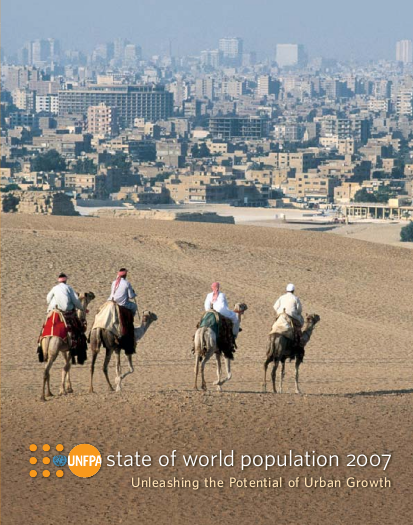
The present Report thus attempts to look beyond current problems, real, urgent and poignant though they are. Yet, it is also a call to action. The Report tries to grasp the implications of the imminent doubling of the developing world’s urban population and discusses what needs to be done to prepare for this massive increase. It looks more closely at the demographic processes underlying urban growth in developing areas and their policy implications. It specifically examines the consequences of the urban transition for poverty reduction and sustainability. An elderly man outside his home: a traditional hutong in Beijing, China. The white character on the wall indicates that the building is scheduled for demolition to make way for “urban development”. It surveys the differing conditions and needs of poor urban women and men, and the obstacles they face as they strive to claim their rights and realize their potential as productive members of the new urban world. Although mega-cities have received most of the attention, conditions in smaller urban areas call for even greater consideration. Contrary to general belief, the bulk of urban population growth is likely to be in smaller cities and towns, whose capabilities for planning and implementation can be exceedingly weak. Yet the worldwide process of decentralizing governmental powers is heaping greater responsibility on them. As the population of smaller cities increases, their thin managerial and planning capacities come under mounting stress. New ways will have to be found to equip them to plan ahead for expansion, to use their resources sustainably and to deliver essential services.
One of the Report’s key observations is that poor people will make up a large part of future urban growth. This simple fact has generally been overlooked, at great cost. Most urban growth now stems from natural increase (more births than deaths) rather than migration. But wherever it comes from, the growth of urban areas includes huge numbers of poor people. Ignoring this basic reality will make it impossible either to plan for inevitable and massive city growth or to use urban dynamics to help relieve poverty.
Resource collections
- UN Habitat - Urban Response Collection
- Urban Response - Urban Crisis Preparedness and Risk Reduction
- Urban Response Collection - Community Engagement and Social Cohesion
- Urban Response Collection - Economic Recovery
- Urban Response Collection - Environment and Climate Change
- Urban Response Collection - Housing, Land and Property
- Urban Response Collection - Urban Crisis Response, Recovery and Reconstruction
- Urban Response Collection - Urban Resilience